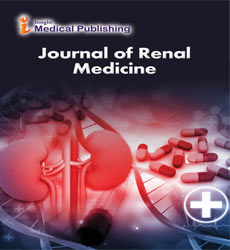Challenges and Innovations in the Future of Kidney Transplantation
Gamal Bonner*
Department of Nephrology, Cairo University Hospital, Cairo, Egypt
- *Corresponding Author:
- Gamal Bonner
Department of Nephrology, Cairo University Hospital, Cairo,
Egypt,
E-mail: bonnerg@gmail.com
Received date: August 16, 2024, Manuscript No. IPJRM-24-19790; Editor assigned date: August 19, 2024, PreQC No. IPJRM-24-19790 (PQ); Reviewed date: September 02, 2024, QC No. IPJRM-24-19790; Revised date: September 09, 2024, Manuscript No. IPJRM-24-19790 (R); Published date: September 16, 2024, DOI: 10.36648/ipjrm.7.5.43
Citation: Bonner G (2024) Challenges and Innovations in the Future of Kidney Transplantation. J Ren Med Vol.7 No.5: 43.
Description
When treating End Stage Renal Disease (ESRD), kidney transplantation is frequently the best option since it gives patients a better chance at survival and longer life expectancy. Despite its success, the field faces significant challenges that impede progress. Simultaneously, numerous innovations are emerging, engage to enhance the efficacy and accessibility of kidney transplants. This article discuss the current challenges in kidney transplantation and highlights the innovative solutions being developed to address these issues. By studying and addressing the obstacles faced in the field, while simultaneously embracing innovative solutions, we can improve the lives of countless individuals awaiting this vital procedure. The future of kidney transplantation is bright, driven by innovation and a commitment to equity and excellence in patient care.
Challenges in kidney transplantation
As challenges persist, ongoing research and technological advancements hold of improving patient outcomes and expanding access to life-saving transplants. Collaborative efforts among researchers, healthcare providers, policymakers and communities will be essential in addressing the multifaceted issues surrounding kidney transplantation. One of the most pressing challenges in kidney transplantation is the acute shortage of available organs. This disparity leads to long waiting times, often resulting in increased mortality for patients on dialysis. This risk necessitates lifelong immunosuppression, which can make patients vulnerable to infections and other complications. Even with successful transplantation, chronic rejection can occur, leading to gradual kidney function decline. Chronic allograft nephropathy remains one of the leading causes of graft loss. Understanding the mechanisms behind this condition is important for improving long-term transplant outcomes. There are marked disparities in access to kidney transplantation based on socioeconomic status, race and geographic location. Minority groups often face longer wait times and lower rates of transplantation, highlighting the need for equitable access to care. Older kidneys may have reduced function, increasing the risk of post-transplant complications. Understanding how to optimize outcomes from older donors is essential as this trend continues.
Innovations in kidney transplantation
To address the organ shortage, many transplant centers are exploring expanded criteria for organ donation. This includes accepting kidneys from older donors or those with mild health issues, known as Donors after Cardiac Death (DCD). While these organs may have a higher risk of complications, studies suggest they can still provide satisfactory outcomes in carefully selected recipients. Machine perfusion is an innovative technique that preserves donor kidneys through controlled perfusion with a preservation solution. This method enhances organ quality and viability by reducing ischemic damage during storage. Recent studies show that machine-perfused kidneys yield better outcomes compared to those preserved using traditional cold storage methods. Advances in pharmacogenomics are prepare for personalized immunosuppressive therapy. By analyzing a recipient’s genetic profile, clinicians can customize immunosuppressive regimens to optimize efficacy while minimizing adverse effects. Researchers are investigating strategies to induce tolerance in kidney transplant recipients, allowing them to maintain function without lifelong immunosuppression. These strategies may include the use of regulatory T cells or targeted therapies to promote immune acceptance of the transplanted organ. Innovations in surgical techniques, such as laparoscopic and robotic-assisted surgeries, have improved the safety and efficacy of kidney transplantation. These minimally invasive approaches result in shorter recovery times and reduced postoperative complications, enhancing overall patient outcomes. The development of non-invasive biomarkers to detect early signs of rejection is a promising area of research. Tools like gene expression profiling and urine proteomics can provide insights into kidney health, allowing for timely interventions before significant damage occurs. One of the most exciting frontiers in kidney transplantation is the development of artificial kidneys and bioengineered organs. Research is underway to create functional kidneys from stem cells or 3D printing technologies, which could eventually alleviate the organ shortage crisis. While still in experimental stages, these innovations hold the potential to revolutionize the field. Remote monitoring technologies allow for ongoing assessment of kidney function and medication adherence, reducing the need for frequent in-person visits and facilitating timely interventions. Implementing community outreach initiatives can help raise awareness in underserved populations. Educational programs that inform individuals about risk factors and available resources can empower patients to seek timely medical care. Implementing equitable criteria for organ distribution can help ensure that all patients, regardless of background, have access to transplantation opportunities. Providing culturally sensitive care can enhance patient engagement and compliance. Training healthcare providers to understand and respect cultural differences can improve communication and encourge trust, ultimately leading to better outcomes.
Open Access Journals
- Aquaculture & Veterinary Science
- Chemistry & Chemical Sciences
- Clinical Sciences
- Engineering
- General Science
- Genetics & Molecular Biology
- Health Care & Nursing
- Immunology & Microbiology
- Materials Science
- Mathematics & Physics
- Medical Sciences
- Neurology & Psychiatry
- Oncology & Cancer Science
- Pharmaceutical Sciences
